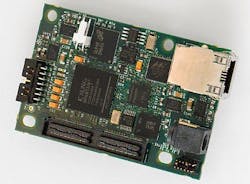Navy researchers choose FPGA-based Ethernet network boards from Orange Tree Technologies
DAHLGREN, Va., 1 April 2013. U.S. Navy researchers at the Naval Surface Warfare Center (NSWC) Dahlgren Division in Dahlgren, Va., needed field programmable gate array (FPGA)-based Ethernet embedded computing boards for a variety of naval weapons research. They found their solution from Orange Tree Technologies Ltd. in Didcot, England.
NSWC Dahlgren officials announced their intention on 25 March to award a sole-source contract to Orange Tree for the company's ZestET1 Spartan-3A FPGA Ethernet board. The value of the contract has yet to be negotiated.
NSWC officials are ordering 101 of the Orange Tree ZestET1 Spartan-3A FPGA Ethernet boards with XC3S1400A and 64 megabytes of memory. The ZestET1 board is a Gigabit Ethernet TCP/IP offload engine and FPGA module that provides a universal interface to connect devices quickly to an Ethernet network at Gigabit speed.
A wide variety of Orange Tree customers in private industry, government, and academia use the ZestET1 FPGA Ethernet board to help develop their own products and to support their research programs. The board measures 50 by 75 millimeters, making it suitable for embedded systems and OEM equipment.
The board sustains a data rate of more than 100 megabytes per second in each direction, with latency is measured at 6 microseconds, and the board can be used for existing and new product designs, Orange Tree officials say.
The FPGA can be programmed from on-board Flash, Ethernet, or JTAG, and can run soft-core processors and higher level protocols such as GigE Vision and Industrial Ethernet. It also can function as a programmable interface to external devices, for processing data on the fly, high speed processing of streaming data, and controlling external devices.
NSWC Dahlgren conducts basic research in systems-related areas including biotechnology, chemistry, mathematics, laser and computer technology, chemical, mechanical, electrical and systems engineering, physics and computer science.
Current projects include the majority of U.S. military research into directed-energy weapons, railgun technology, and weapons integration for the Littoral combat ship.
For more information contact Orange Tree Technologies online at www.orangetreetech.com, or NSWC Dahlgren at www.navsea.navy.mil/nswc/dahlgren.
